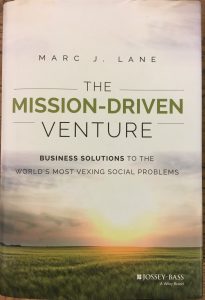I have been reading “The Mission Driven Venture” by Marc J. Lane. The sub title is: “Business solutions to the world’s most vexing social problems”. It provides an overview of many different topics relevant in the social enterprise sector including examples where new ways of doing things have been tried and been successful. From my perspective as a lawyer it is interesting because the author is an attorney in the United States so there is often mention of legal structures.
The preface contains an overview of what comes as the author argues that new business strategies are solving social problems in education, health care, poverty and the environment. He writes: “For-profit, social purpose businesses are defining success in terms of both financial and social returns. Nonprofits are becoming entrepreneurial, supplementing charitable donations and government grants with revenue earned by the businesses they own and run, instrumentalities of mission in their own right. Progressive nonprofits are partnering with each other, and even with for-profits, breaking down cultural barriers, leveraging their competencies, and gaining economies of scale. A growing number of passionate social entrepreneurs are deploying invested capital to test and develop business opportunities intended to drive positive social change.”
He goes on to give the following specific examples: “Newly validated business models and entity forms that invite collaboration are emerging, including the low-profit limited liability company (L3C), which, by law, laces mission above profits and faciliteates foundation funding of chariatable and educational businesses, and the benefit corporation, which requires its managers to make decisions not only to enrich its shareholders, but also for the good of society as a whole. Social impact bonds – futures contracts on social impact – provide long term funds for promising social interventions, transfer risk to privacy capital markets, and tap into public coffers only when specific social benefits are achieved, Microfinance and microcredit are helping the poorest of the poor become self sufficient business owners. And worker owed co-operatives are converting the disenfranchised into self-reliant entrepreneurs”
Some of the most interesting examples I found in the book that were given were as follows:
- the section on where to begin for those who have a good idea was a nice overview of some of the key considerations that a founder needs to think through. It is certainly one thing to have a groundbreaking and unique idea it is a rare combination to have the right experience, drive and team to be able to implement that idea.
- the section on the Nobel peace prize winner Mohammed Yunus (who visited Christchurch April 2017 and who I went along to listen to) went into a lot of depth about not just the Microfinance industry and Grameen Bank but also about the social business ideas that he advocates. It was also interesting to read more about his theory that a social business may profit but its investors must not – am not sure I agree with that.
- the section about co-operatives in Europe and in particular Spain where many companies have risen which are owned by their workers. This was interesting to read about but not sure if it would be transferable to other places which did not have the history of them going back several decades.
- the section on impact investing was interesting to read and gave glimpses of the possibilities – this quote summarizes that: “Impact investing is investing with a mission. It’s an investment strategy that merges profit-seeking with philanthropy. When an impact investor invests, he or she seeks a financial return and a social return – to make money and help clean the air we breathe, or feed the hungry, or build butter schools. An impact investor does not put profit in conflict with social progress.”
- three chapters at the end are devoted to how to assess impact investing and work out what it has achieved. As he states: “Unlike the traditional profit-driven business, an enterprise Int he business of producing an intangible bottom line – social good – cannot measure success in terms of dollars alone. In addition to demonstrating profitability – or at least financial sustainability – mission-driven ventures must show that they’re making progress toward achieving their social missions. They must demonstrate their social impact.” But how do they actually do that – what metrics will they report on? How will you compare an organisation focusing on alleviating poverty with one focussed on reintegration of prisoners into society? These are the challenges that these chapters deal with as they wrestle with what “social metrics” might look like.
- It would be great if the next edition of the book features some examples and discussion of developments in places like Australia, New Zealand, Asia or South America.
To conclude this overview of the book I think it achieves the purpose the author set out in the preface – “…the Mission Driven Venture recounts the life stories of modern day heroes, people who, for very personal reasons, took on a social challenge as their own and vowed to overcome it through the prudent application of sound business principles. The lessons they learned and the successes they won translate into models worth replicating and adapting. My hope is that their thought leadership will help inform your decisions and inspire your actions.”
I would recommend this book to anyone who wants to get a really good overview of the state of social enterprise around the world today and gain a glimpse into what the future might look like at the same time. If you are in Christchurch and would like to have a look at or borrow my copy send me an email at stevenmoe@parryfield.com




